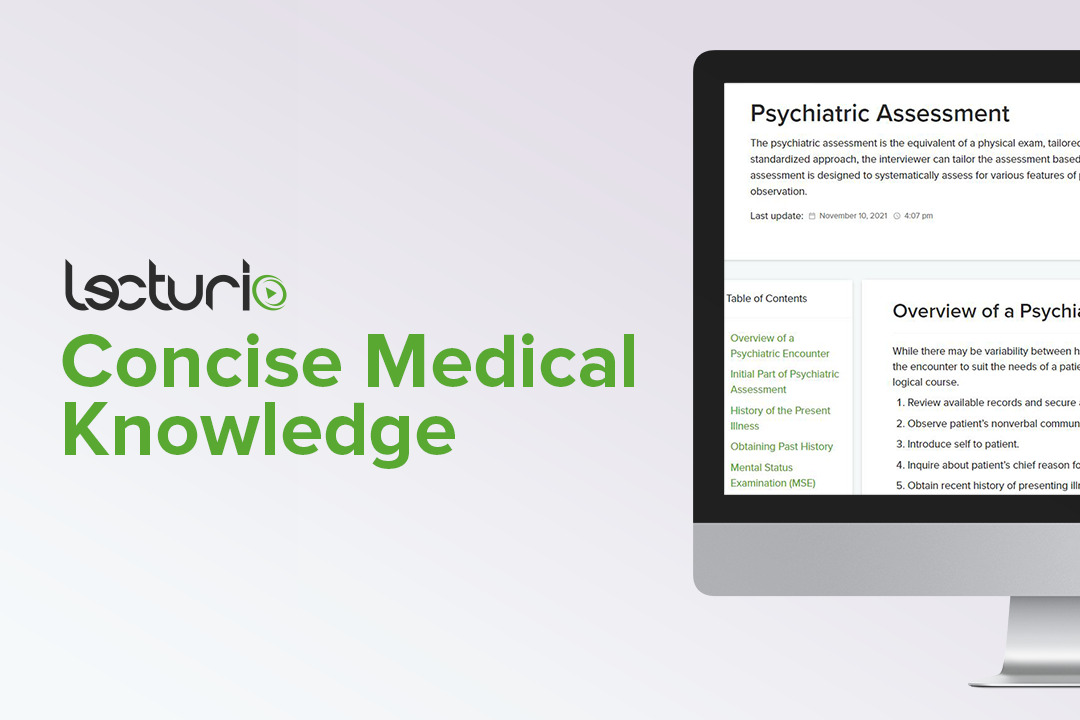Playlist
Show Playlist
Hide Playlist
Psychiatric History
-
Slides Psychiatric History.pdf
-
Download Lecture Overview
00:01 Let's talk now about the components of the psychiatric history and assessment. 00:06 When taking a history from a patient, forming a therapeutic alliance is going to lay the foundation for your work with that patient. So making an alliance is extremely important. 00:18 Here are a few tips to help you build that strong bond with your patient. 00:23 First, don't forget to introduce yourself. Allow the patient to feel comfortable by creating a room in an atmosphere that's inviting and welcoming for them. 00:33 Also, invite your patient to share a narrative or a story. Avoid asking yes and no questions but rather open the floor to them and be nonjudgmental as they tell you what's on their mind. 00:46 Always follow your patient's lead. They may go off on tangents but it's important to follow their train of thought. This helps them feel comfortable and it lets them feel as if they can trust you. 00:59 Also, in that very first encounter, remember to respect the patient's wishes to avoid certain subjects. 01:06 You can always come back to it later. And finally, staff safety is just as important as patient safety. 01:14 Therefore, before initiating an encounter with any patient, make sure that the room is staged in a way that people feel comfortable and also exits are easily accessible for the patient and staff alike. 01:29 Taking a patient's history involves several components that are all very important. 01:35 For example, begin with open-ended questions and then you can always narrow down your approach based off of that patient's chief complaint. Explore the present illness with the patient. 01:48 Ask them about their symptoms, what precipitated this event, what kind of social setting they're in and what kind of supports they have. Be curious about their current and past treatment options and complications that they've had. Also, collect thorough information. 02:08 This is a psychiatric assessment but it's extremely important that not only do you ask about psychiatric history, you also inquire about medical and surgical history. 02:19 Ask about substance abuse history, family history, medications that the patient is taking, their allergies and safety, including not only their present safety but past suicidal and homicidal thoughts, consider their social history and their developmental history. 02:38 Finally, when taking the mental status exam, this is a critical component of the psychiatric assessment. 02:44 It's basically equivalent to what you do in medicine when you do a physical exam. 02:49 The mental status exam includes your observations, direct questions to the patient about their thoughts, beliefs, perceptions and cognition and it also creates a picture of the patient. 03:02 So, consider the mental status exam as something that you can use as a tool to describe them to peers, colleagues and other members of the treatment team. 03:13 They should be able to formulate a picture of the patient without having ever met them solely based off of your descriptions from their mental status exam. When you formulate a patient, there are a couple of things to consider. First of all, depending on your setting, you may be referring to diagnostic criteria according to an ICD-10 or a DSM-5 coding system. 03:40 Also, it's important to take a biopsychosocial approach to the patient when you're formulating their illness and also their treatment and their future trajectory. 03:51 The biopsychosocial approach includes things like considering biological, psychological and social predisposing, precipitating and perpetuating factors that are interfering with one's ability to achieve the best of mental health.
About the Lecture
The lecture Psychiatric History by Helen Farrell, MD is from the course Psychiatric Assessment.
Included Quiz Questions
Which of the following is NOT a component of therapeutic alliance?
- Asking ‘yes’ or ‘no’ type questions frequently
- Introducing yourself
- Following the patient's wish to not talk about certain subjects
- Creating a comfortable environment
- Pre-planning staff safety before entering the room with a patient
Which of the following is the MOST CRITICAL component of a psychiatric assessment?
- Mental status examination
- History taking
- Formulating using ICD-10 or DSM-5
- Therapeutic alliance
- Observation
Customer reviews
5,0 of 5 stars
| 5 Stars |
|
2 |
| 4 Stars |
|
0 |
| 3 Stars |
|
0 |
| 2 Stars |
|
0 |
| 1 Star |
|
0 |
Awsome teaching! Will highly recommend. Astonishing effort of the Lecturio team.
muy claro los temas , lo recomiendo para los estudiantes de medicina que quieren repasar la hc




